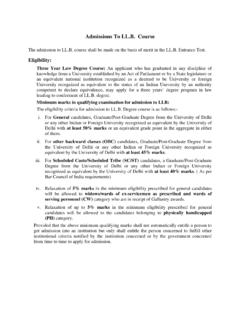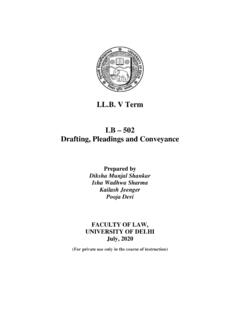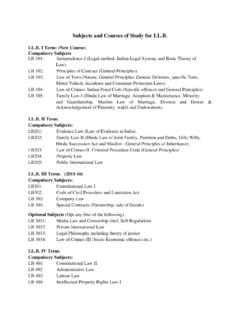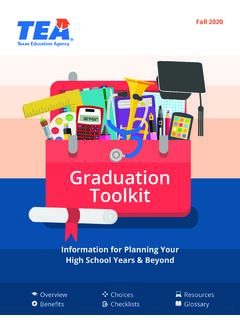Transcription of LL.B. V Term - Faculty of Law, University of Delhi
1 1 V Term LB 501: MOOT COURT, MOCK TRIAL AND internship Prepared and Edited by Ved Kumari Vageshwari Deswal Alok Sharma Sunanda Bharti Kshitij Kumar Singh Kailash Jeenger Apeksha Kumari Jupi Gogoi Haris Jamil Nidhi Minz Faculty of Law University of Delhi Delhi 110007 July, 2020 (For private use only in the course of instruction)2 V Term LB 501: Moot Court, Mock Trial and internship Course Objectives: This Course aims to impart the practical skills of research, case analyses and strategy, witness handling, presentation of arguments at the trial and appellate stages of a case, and to draft and prepare the relevant documents pertaining to Moot Court, Mock Trial and internship . The course has been divided into four components dealing with Moot courts, Mock trials, Court visits and Viva Voce/attendance. The purpose is to expose the students to the system of administration of justice in real life by visiting various courts and chambers of practicing counsels.
2 This learning is basic and essential for the study of professional course of Law. By learning the practical aspect throughout the Course, the students shall gain the expertise in research and preparing the legal documents, filing and contesting the cases on strong grounds before the Courts of Law in India as well as in other countries. Course Learning Outcomes: After successful completion of this Course, students should be able to: 1. practice at all the stages of any case/matter and at all the fora with critical thinking 2. do appellate advocacy by independent research, preparation of arguments and presenting arguments in a persuasive manner in appellate courts 3. do trial advocacy, , case analysis, client interviewing and advise, how to conduct examination in-chief and cross-examination of witnesses, preparation and presentation of arguments on facts and law in the trial courts. 4. interview clients and advise them on procedural aspects of litigation, costs and possible legal and social consequences, etc.
3 5. work in teams and develop the cooperative nature essential for the legal practice. Contents: Unit I: Mock Trial including Client Interviewing and Counselling and Case Analyses A- Client Interviewing Counselling- Oral exercise (5 marks) The students will learn the basics of client interviewing and counseling through simulation exercises. B- Case Analyses-Witten exercise (5 marks) The students will be required to do case analyses in the mock trial exercise to be done by them. C- Mock Trial including Examination in Chief, Cross Examination, oral arguments, and written submission of arguments-5 marks each (Total 20 marks) At least two mock trials, one Civil and one Criminal will be conducted during the course of the semester. The students will be divided in teams of lawyers and 3 witnesses. Each student will be required to function as a lawyer and witness in the mock trials being simulated in the classroom. Unit II: Moot Courts The teacher teaching this course will supply three Moot Court problems to the students in the course of a single semester requiring them to work on all three problems assigned to them, prepare written submissions (memorials) and present oral arguments in a moot court setting.
4 30 marks for this component are divided equally between written submission and oral arguments. Students may be asked to work in teams at the discretion of teacher. Each student will prepare a case only on one side. A. Rules re Memorial submissions: 1. Each student must submit one typed and bound copy of the memorial on either side no later than the date fixed and announced in the class. Memorials will not be accepted after the prescribed date and time and the student will lose the marks assigned for that assignment. 2. Memorial specifications: a) Memorials must be printed on A4 size white paper with black ink on both sides of the paper. b) The body of the memorial must be in Fonts Times New Roman, Size 12 and footnotes in Fonts Times New Roman in Size 10. c) Each page must have a margin of at least one-inch on all sides. Do not add any designs or borders on the pages. d) Memorials should be submitted with differently coloured Title Page for each side: Title page in blue colour for Petitioner / Appellant Title page in red colour for respondent The students shall provide their full name, enrollment number and exam roll number on the title page only.
5 E) The Memorial should not exceed 20 typed pages (line space ) and shall consist of the following Parts: Table of Contents Statement of Facts Statement of Jurisdiction List of References and Cases Statement of Issues Summary of Arguments 4 Detailed Pleadings Prayer Affidavit, if necessary f) Relevant Annexures may be kept by the student and may be used during oral arguments, if necessary. B. Rules re Oral Arguments: Court Language shall be English unless prior permission is sought from the teacher to speak in Hindi. Each student would be given 10 minutes to present their oral arguments Judges may, at their discretion extend oral argument time, up to a maximum of 5 minutes. Rebuttal would be allowed only to the petitioner and they would have to specify in the beginning the time they want to set apart for rebuttal. Evaluation: The oral performance will be evaluated on the basis of communication skills, application of facts, persuasion / use of authorities, and response to questions.
6 Unit III: internship - Court Visit / Chamber placements This part will require the students to be attached with practicing lawyers with a minimum of ten years standing at the Bar. Preparation for this component has to begun from the first semester. Each student is required to spend at least one month doing internship during the summer vacation / winter break / mid-semester break. Full time internship during the semester is not permitted by the Bar Council of India and students may do only project work during the semester. During the internship , the students must keep record of client dealings, research and drafting done, fact investigations, etc. A certificate confirming the student s attendance and the work done during internship shall have to be attached with the internship diary to be submitted at the end of this semester. During the court visits, the students are required to observe the following stages and write reports of their observation in the diary: Framing of charges/Issues Examination-in-Chief Cross-examination Final arguments In the lawyer s chamber, they are required to do and record the following: 5 1.
7 Read minimum of four case files to learn how files are prepared and maintained 2. Learn how to maintain records and accounts 3. Do legal research in at least two cases 4. Draft minimum of two documents in an ongoing case in the chamber 5. Observe client interviewing and counselling with the permission of the lawyer and clients in at least two cases The students are expected to maintain a diary of their field visits, work done during placement and their observations. In the diary, they have to keep a log of the time spent by them each day including factual accounting of their experience of what they are doing, seeing and hearing. However, the diary should not be only descriptive of each day but should focus on what they learnt during the day. What were they thinking and feeling about their experiences? What is exciting or surprising? What is bothering them? What are their questions or insights about lawyering and judging?
8 What criticism or praise do they have for the legal system? What else would they like to be taking place in their experience? They should be careful that while writing their accounts they do not reveal any confidential information. The diary should contain two parts: (a) the factual and analytical information about their internship ; and (b) two legal documents drafted by them during internship . Each part will be evaluated separately for 15 marks each. This part carries a total of 30 marks. The diary is an integral part of the course and they will be evaluated in terms of thoughtfulness and reflections about their learning experience. They must be sure to write the journal in their own words even if they went with another class fellow or were in a group and observed the same things. Note: In case of copying under any of the Units of the Course, matter will be reported to the authorities and a suitable action will lie as per the rules of University .
9 Suggested Readings 1. NRM Menon (ed.) Clinical Legal Education (1998) 2. Don Peters, The Joy of Lawyering: Readings for Civil Clinic (1996) 3. B. Malik, The Art of a Lawyer (9th Ed. 1999) 4. Steven Lubet, Modern Trial Advocacy: Analysis and Practice (1993) 5. Thomas A. Mauet, Trial Techniques (1996) 6. Thomas A. Mauet, Pre- trial (1995) 7. Inns of School of Law, Advocacy (1999/2000) 8. Inns of School of Law, Case Preparation (1999/2000) 6 Readings Supplied in Course Material 1. Client Interviewing in Don Peters, The Joy of Lawyering, pp. 5-20 8 2. Client Interviewing and Counseling by Margaret Barry and Brian Landsberg 30 3. Advice in Conference Skills, Inns of Court School of Law, pp 131 -150 (1999/2000). 34 4. Kinds of Questions Summary by Prof. Ved Kumari from Don Peters, Joy of Lawyering 59 5. Advocacy Objectives 61 6. Case Analysis, Persuasion, and Storytelling in Steven Lubet, Modern Trial Advocacy: Analyses and Practice, pp 1-13 63 7.
10 Questionnaire for Interviewers 75 8. Case Planning Chart by Jane Schukoske 79 9. Communication Body Language 80 10. L. Spasova, Paralinguistics as an Expression of Communicative Behaviour in Trakia Journal of Sciences, Vol. 9, Suppl. 3, pp 204-209, 2011 82 11. The Trial Advocate in Roger Haydock and John Sonsteng, Trial: Theories, Tactics, Techniques 89 12. Hislop s Advocacy Training (Mimeo) 106 13. Gray's Inn Advocacy Course for Pupils: 1993-1994 113 14. Examination-in-Chief Headlines 128 15. Art of Interrogation in Somasekhara (ed.) Aiyar & Aiyar s The Principles and Precedents of the Art of Cross-Examination (Tenth Edition, 2004) pp. 145-182 129 16. Witness Handling: Case 1 State v. Monty Khanna by Aman Hingorani 155 17. Witness Handling: Case 2 State v. Mukesh by Aman Hingorani 163 18. Witness Handling: Case 3 Raj Malhotra v. Shivani Malhotra by Aman Hingorani 168 19. Witness Handling: Case 4 Singer Consultants Pvt.















